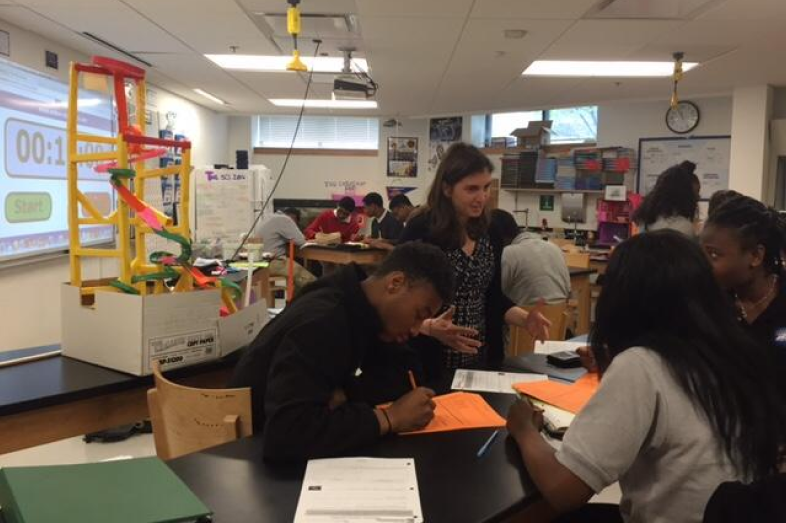

At Codman Academy Charter Public School, the walls in the lower school hallways aren’t covered in the bright reds, yellows, and oranges visitors might expect in an elementary setting. Instead, they’re subdued neutrals, mostly creams and browns. Rather than large chart paper displays and murals, there are natural wood panels, internal and external windows, and glass panels decorated with branches and leaves.
“Bright colors are triggers for kids on the autism spectrum and traumatized kids,” said Meg Campbell, the executive director and founder of the Boston school. “We’re in the heart of what many people consider a very dangerous neighborhood. … A walk in the woods is the idea of the building.”
A handful of education reporters had the chance to visit the charter school, which serves about 350 K-12 students, in early May as part of the Education Writers Association national conference. Their visit also coincided with one from the Massachusetts education commissioner, who presented Codman teacher Sydney Chaffee with the Teacher of the Year award, the highest honor for an educator in the state.
The school, located in Dorchester, a predominantly African-American neighborhood in Boston, was founded 15 years ago and has a special focus on exploration and wellness. Classes use an inquiry model, in which students learn through real-world projects rather than lectures. Before starting Codman Academy, Campbell founded Expeditionary Learning, an instructional model that also espouses project-based instruction. (Find out more about these student-centered learning approaches here.)
In a high school physics classroom, reporters saw students designing roller coasters (determining a theme, drawing models, choosing materials, and budgeting for construction) which they would later create out of construction paper.
As Principal Thabiti Brown explained: “We’re building the supply side of learning –getting kids excited so they’ll put in the energy needed to do well.”
Fit and Healthy Students
Health and wellness are part of the fabric of the school. In fact, the high school is located in a health-care center, across the street from the elementary school building, which is just a year old. The school nurse is an employee of the health center, and students have access to medical and dental care on campus. Many students do internships at the center over the summer.
All Codman students receive fresh, healthy lunches everyday, and families can also pick up groceries at a monthly food pantry.
“Kids love to get honey buns and go to McDonald’s, but that’s one thing on campus – (junk food) can be confiscated,” said Lenward Gatison, the school’s wellness director. (McDonald’s is, temptingly, located just down the block.)
The elementary school cafeteria is designed so that students pass a sink on the way in, and can wash their hands before they get in the lunch line.
“This is going to be what schools start to look like,” said Campbell.
Priscilla Chan and her husband, Facebook creator Mark Zuckerberg, are using Codman as a model for a private school for low-income students they plan to open next year. Chan even completed part of her rotation as a pediatric physician at the Codman health center, said Campbell.
About a quarter of the students at Codman have special needs, a much higher percentage than the national average of about 13 percent. Campbell said the model, which pays special attention to students’ social and emotional development, appeals to many parents of students with special needs, so lots of them apply to the lottery.
The administrators at Codman are open about the fact that the school still has many challenges. Test scores are lackluster, only about 40 percent of students are matriculating to postsecondary institutions (though this is higher than the national average for black students), and too many elementary students were suspended in past years.
But “we’ve implemented changes, and we’re in a beautiful space, and our suspensions have plummeted,” Campbell said.
Teacher of the Year
The day the education reporters were visiting was, in fact, quite a special one. Massachusetts Commissioner of Elementary and Secondary Education Mitchell Chester presented Sydney Chaffee, a 9th grade humanities teacher, with the 2017 state Teacher of the Year award.
After touring the school, chatting with teachers and students, and wandering in and out of classrooms, the reporters joined the high school students and staff members for the award presentation.
The assembly kicked off with an impressive performance by a member of the high school’s slam poetry group. Omar Grey delivered a moving piece on “slactivism,” in which he chided his generation for thinking that “likes” and “retweets” on social media can make a dent in real societal problems like racism, misogyny, and cancer.
“We tweet online, but when it’s riot time we act like flocks of birds who can’t sing,” he said, finishing to loud cheers from his classmates.
In a speech, Chester recognized Chaffee for her many leadership roles and highlighted that she is the first charter school teacher to receive the state award.
Tia Murray, a Codman high school student, also gave a speech, noting that not all heroes wear spandex and capes.
“You wear bright colors and flats, and you still manage to save me academically,” Murray said of her teacher.